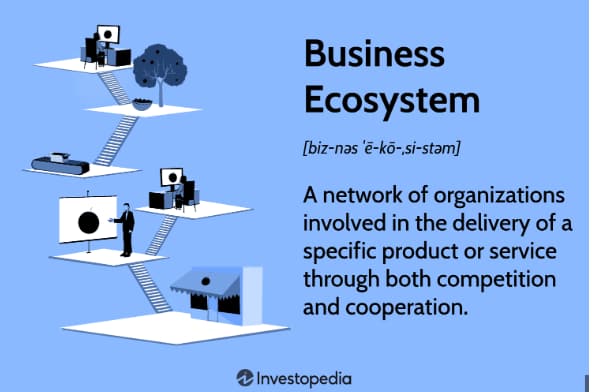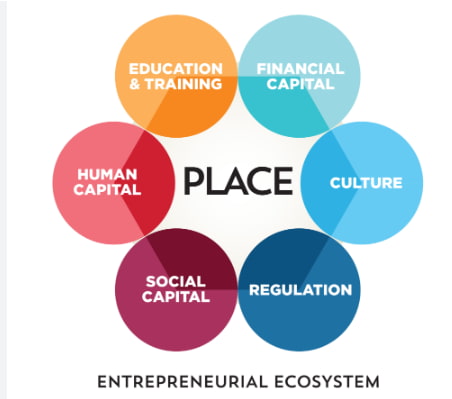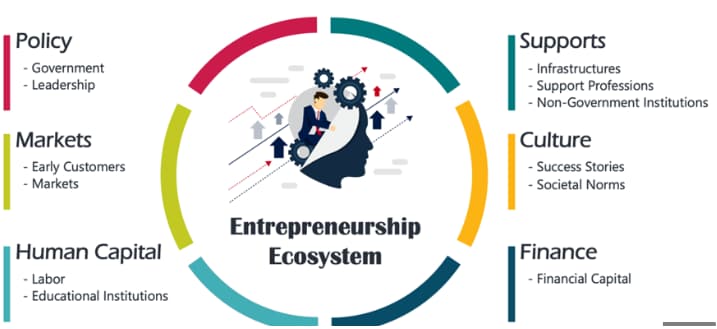Contents
There must be no one who hasn’t heard the word “ecosystem” lately. It constantly comes up in meetings, news, and social media. So, what exactly does this word mean when we’re not talking about trees or insects? You know, those famous phrases “startup ecosystem,” “business ecosystem,” WWe wanted you to hear them in our own words. Because this concept is much more important than you think, especially for those who dream of starting a new business.
In its simplest and most general form, an ecosystem is a natural system where living beings (animals, plants, microorganisms) and the inanimate environment (air, water, soil, etc.) in a certain area come together and interact with each other. In other words, the perfect functioning of nature within itself… Thanks to this order, every being in nature connects with each other, shares resources, and lives in balance. In this article, we will examine the definition more closely on the basis of entrepreneurship and the startup world.
In this short article, we will discover together, without any confusion, in the most understandable way, exactly what an ecosystem is in this sense, who and what is in it, and most importantly, why it is so vital. If you are ready, let’s open the doors to this vibrant and dynamic world!

What Does Ecosystem Mean? (Not Just Forests!)
When we hear the word “ecosystem”, the first thing that comes to mind for most of us is the lush forests we remember from biology classes, colorful coral reefs or the complex network of living and non-living entities in a lake. And you’re right! Essentially, an ecosystem is the totality of relationships between living organisms (plants, animals, microorganisms) living in a certain area and the inanimate environment (air, water, soil, sunlight) with which these organisms interact.
It is a system built on a delicate balance where each part affects the other and is dependent on each other. Just as a butterfly’s wing flap can cause a storm on the other side of the world, even the slightest change in this structure can affect the entire structure.
So, what does this biological definition have to do with our business world and entrepreneurship? This is where this wonderful analogy comes into play. Just like in nature, we are talking about an “ecosystem” in the business world and especially in the field of entrepreneurship. Here, instead of “living organisms,” we mean entrepreneurs, investors, mentors, universities, large companies; Instead of the “inanimate environment”, we can put legal regulations, infrastructure, culture and market conditions. All these players and elements form a network that constantly interacts with each other, feeds each other and is affected by each other. In other words, the business ecosystem is a living, dynamic and constantly evolving structure, just like a natural structure.
In more precise terms, an entrepreneurial ecosystem is an environment formed by all the actors, institutions, resources and relationships that support the sprouting and growth of new ideas and the emergence and development of innovative companies (startups). In this environment, an entrepreneur with a bright idea can find the capital he needs to bring his idea to life, receive mentorship from an experienced person, reach talented employees and discover the necessary channels to bring his product to the market.
Investor presentations, startup idea discovery methods, why they fail, in short, a healthy ecosystem is like a fertile valley where species that support each other live together, rather than a forest where a startup tries to survive on its own.

Different Types of Ecosystems in Startups
These ecosystems can be at different scales. For example, while Silicon Valley is an example of a global entrepreneurship structure, cities such as Berlin, London, and Tel Aviv also have their own strong local system structures. On a smaller scale, we can also talk about a technology system formed around a specific university or a niche structure focused on a specific sector (e.g. financial technologies – fintech). What is important is how compatible the parts within these structures work with each other and how favorable an environment they provide for new initiatives to flourish. Each ecosystem may have its own dynamics, strengths, and weaknesses.
It should not be forgotten that these structures are not static structures; they are in constant change and development. They are shaped by the participation of new players, technological developments, changing market conditions, and even government policies. Just as a gardener must constantly feed and maintain his garden, a business system requires the active effort and contribution of all stakeholders to remain healthy and develop. That’s why the word “ecosystem” is more than just a buzzword; it has a deep meaning that denotes collective effort and interdependence.
Indispensable Elements of an Entrepreneurial Ecosystem?
So, what are the cornerstones that make an entrepreneurial ecosystem important, in other words, those indispensable players and elements? Let’s think about it this way: What does a seed need to sprout and turn into a huge tree? Water, sun, fertile soil and an environment that will protect it from pests, right? A startup idea also needs similar “nourishing” elements to grow and turn into a successful company. Each of these elements plays a critical role in the healthy functioning of the ecosystem. Let’s get to know these important players and building blocks a little better.

- First of all, entrepreneurs and startups are of course at the heart of these structures. They are the driving force of the ecosystem with their innovative ideas, courage to take risks and endless energy. They are the ones who produce new solutions to new problems, disrupt existing markets and shape the future. However, no matter how brilliant their idea is or how hard-working they are, it is very difficult for them to progress on this difficult journey alone. This is exactly where the other players of the structure come into play and support them.
- One of the things entrepreneurs need the most is undoubtedly financing sources. (Like Business Loans) Here, we come across investors. These can be early-stage angel investors, larger-scale venture capital funds (VC), crowdfunding platforms, and sometimes even government-supported grant and loan programs. Investors not only provide money, they also contribute to entrepreneurs’ growth by offering their experience, networks, and strategic guidance. Without them, many bright ideas may be doomed to remain on paper.
Acceleration Programs and Universities
- Another vital element is supporting institutions and mentors. Accelerator programs and incubators provide young startups with opportunities such as office space, training, mentoring and access to investor networks, helping them take their first steps more firmly. Co-working spaces create environments where entrepreneurs can come together, network and exchange ideas. Experienced mentors and advisors guide entrepreneurs with their knowledge and experience, help them avoid mistakes and support them in their strategic decisions.
- In addition, universities (as a source of research and talent), large companies (as potential customers, partners or investors), government and public institutions (with regulatory and supportive policies), professional service providers (lawyers, accountants, etc.) and even the cultural perspective of society in general towards entrepreneurship and risk-taking are also important parts of the ecosystem. When all these gears work in harmony, the entrepreneurship system becomes truly vibrant and productive, creating fertile ground for new ideas to flourish. It is important to know examples of successful startups and ultimately failed startup ideas.

Why a Healthy Ecosystem So Important
So far, we have talked about what an ecosystem is and who it consists of. So, why is this whole complex structure so important? So, as an entrepreneur, you may be thinking, “What good does this ecosystem do me?” The answer is simple: Many! A healthy and functioning entrepreneurial structure provides countless benefits not only for individual entrepreneurs, but also for the entire society and economy. Just as all the organs of a healthy body work in harmony, a healthy structure adds value to all its stakeholders.
The most obvious benefit for an entrepreneur is that they can access the resources they need more easily. Just think, you have a bright idea but you don’t have the capital to implement it. In a healthy ecosystem, you are much more likely to find angel investors or VCs to whom you can present your idea, who will believe in you and invest. Or if you are stuck on a technical issue; you can get support from a mentor in the general structure or another entrepreneur who has gone through similar paths.
Do you need a talented software developer? It will be easier for you to reach recent university graduates or experienced people who have left other startups within this structure. In other words, you know you are not alone.
A healthy ecosystem not only facilitates access to resources, but also encourages the sharing of knowledge and experience. Through organized events, conferences, workshops and even informal meetings, entrepreneurs learn from each other, get inspired by success stories and learn from failures. This constant learning and interaction also ignites the fuse of innovation and creativity. The coming together of people from different disciplines often leads to the birth of unexpected and groundbreaking ideas.
Contribution to Economy and Innovation Culture
From an economic perspective, strong entrepreneurial ecosystems are the engine of innovation, employment, and economic growth. Successful startups create new jobs, develop new technologies, and increase international competitiveness. This means more tax revenue, higher living standards, and a more dynamic economy. This is the main reason why states and local governments develop various policies to support entrepreneurial structures. In a way, it is an investment in the future.
Finally, a healthy ecosystem increases resilience and competitiveness. Entrepreneurship is a challenging journey, and failures are part of this journey. However, entrepreneurs with a strong support network can more easily stand up to challenges, learn from their mistakes, and continue on their way. In addition, competition in these structures pushes entrepreneurs to constantly improve themselves and offer better products and services. This is a situation that benefits both entrepreneurs and end users. In short, a healthy structure is one of the best examples of the saying “unity is strength.”
Here it is, dear friends! What we call an “ecosystem” is actually a living network that we are all part of, connected and affecting each other. Whether you are an entrepreneur chasing a bright idea, an investor, a mentor or just a curious observer… It is in the best interest of all of us for this ecosystem to be healthy and productive. Remember, each of us can be a cog in this structure and make a contribution, no matter how small.
Creating an environment where ideas are shared freely, failures are seen as lessons, and collaboration is as valuable as competition will open the door to the great success stories we dream of.
So, let’s take ownership of our ecosystem and grow it together, what do you say?
